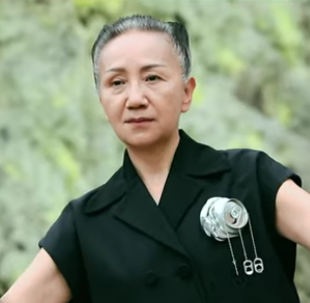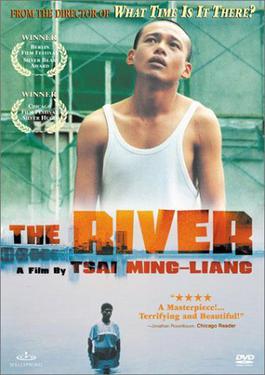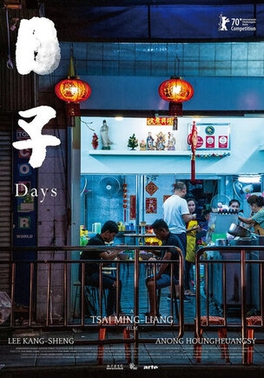Related Research Articles

Tsai Ming-liang is a Malaysian-Taiwanese filmmaker. Tsai has written and directed 11 feature films, many short films, and television films. He is one of the most celebrated "Second New Wave" film directors of Taiwanese cinema. His films have been acclaimed worldwide and have won numerous awards at festivals. In 1994, Tsai won the Golden Lion at the 51st Venice International Film Festival for the film Vive L'Amour.

Goodbye, Dragon Inn is a 2003 Taiwanese comedy-drama slow cinema film written and directed by Tsai Ming-liang about a movie theater about to close down and its final screening of the 1967 wuxia film Dragon Inn.

Vive L'Amour is a 1994 Taiwanese New Wave film directed by Tsai Ming-liang. It is Tsai's second feature film and premiered at the 51st Venice International Film Festival, where it won the prestigious Golden Lion. The film is about three people who unknowingly share an apartment in Taipei.

Dragon Inn is a 1967 Taiwanese wuxia film written and directed by King Hu. The film was remade in 1992, as New Dragon Gate Inn, and again in 2011 as The Flying Swords of Dragon Gate.

The Wayward Cloud is a 2005 Taiwanese film directed by Tsai Ming-liang and starring Lee Kang-sheng and Chen Shiang-chyi.

The Hole, also known as The Last Dance, is a 1998 Taiwanese drama-musical film directed by Tsai Ming-liang. It stars Yang Kuei-mei and Lee Kang-sheng.

What Time Is It There? is a 2001 Taiwanese film directed by Tsai Ming-liang. It stars Lee Kang-sheng, Chen Shiang-chyi, and Lu Yi-ching.

Rebels of the Neon God is a 1992 Taiwanese drama film written and directed by Tsai Ming-liang in his feature film directorial debut. It stars Lee Kang-sheng, Chen Chao-jung, and Jen Chang-bin.
Lee Kang-sheng is a Taiwanese actor, film director and screenwriter. He has appeared in all of Tsai Ming-liang's feature films. Lee's directorial efforts include The Missing in 2003 and Help Me Eros in 2007.

I Don't Want to Sleep Alone is a 2006 Malaysian-Taiwanese romantic drama film written and directed by Tsai Ming-liang. Lee Kang-sheng stars in a dual role as a brain-dead patient and as an injured homeless man. The film also stars Norman Atun and Chen Shiang-chyi.
Chen Shiang-chyi is a Taiwanese actress. She has appeared in most of Tsai Ming-liang's feature films.

Lu Yi-ching is a Taiwanese actress. She has appeared in several films directed by Tsai Ming-liang, such as What Time Is It There? and The Wayward Cloud, and films by Cheng Wen-tang, including Blue Cha Cha. Lu lives in Taipei.

Help Me, Eros is the second film from director Lee Kang-sheng, following his directorial debut in 2003, The Missing.

The River is a 1997 Taiwanese film directed by Tsai Ming-liang and starring Lee Kang-sheng, Miao Tien, and Lu Yi-ching. The plot centers on a family who has to deal with the son's neck pain. In 2003, a critic called it Tsai's "bleakest film."

Face is a 2009 Taiwanese-French film written and directed by Tsai Ming-liang.
Sweet Degeneration is a 1997 Taiwanese drama film written and directed by Lin Cheng-sheng. It was entered into the 48th Berlin International Film Festival.

Stray Dogs is a 2013 drama film written and directed by Tsai Ming-liang. The Chinese title of the film is Jiaoyou, which means "Excursion." An international co-production of Taiwan and France, the film stars Lee Kang-sheng.

Chen Chao-ming is a Taiwanese politician.

No No Sleep is a 2015 mainland China—Taiwan—Hong Kong short film by Taiwanese film director Tsai Ming-liang, winning Best Director at the Taipei Film Awards in 2015. It features Taiwanese actor Lee Kang-sheng and Japanese actor Masanobu Andō, and includes non-sexual full-frontal male nudity.

Days is a 2020 Taiwanese slow cinema drama film directed by Tsai Ming-liang. It was selected to compete for the Golden Bear in the main competition section at the 70th Berlin International Film Festival. It won the jury Teddy Award at the 70th Berlinale.
References
- 1 2 3 4 Hu, Brian. "Goodbye City, Goodbye Cinema: Nostalgia in Tsai Ming-liang's The Skywalk is Gone". sensesofcinema.com. Retrieved 2010-12-17.
- 1 2 Braester, Yomi. Painting the City Red: Chinese Cinema and the Urban Contract (Duke University Press, 2010), pp. 187-189.
- ↑ Laughlin, Charles A. Contested Modernities in Chinese Literature (Macmillan, 2005), p. 157.
- 1 2 Yu Sen-lun. "Tsai Ming-liang continues his search for a vanishing Taipei". taipeitimes.com, April 25, 2003. Retrieved 2010-12-17.
- ↑ Lee, Nathan. "Popcorn Flicks & Art-House Feasts". nysun.com, May 25, 2005. Retrieved 2010-12-17.
- ↑ Willmott, Don. "Goodbye, Dragon Inn". filmcritic.com, September 21, 2004. Retrieved 2010-12-17.